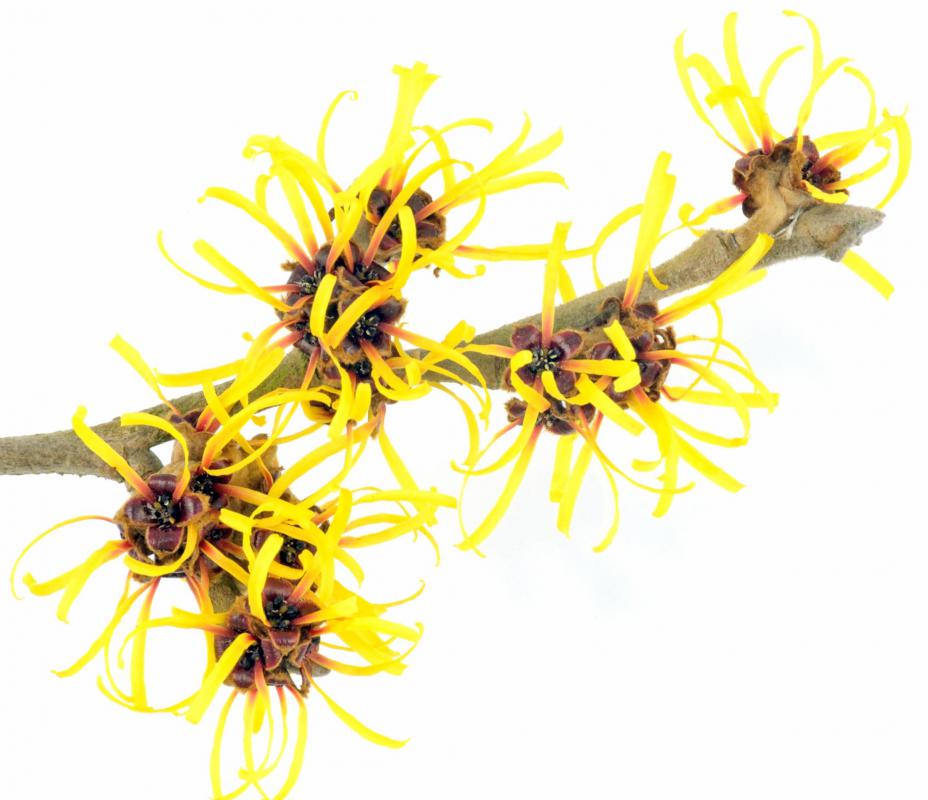At WiseGEEK, we're committed to delivering accurate, trustworthy information. Our expert-authored content is rigorously fact-checked and sourced from credible authorities. Discover how we uphold the highest standards in providing you with reliable knowledge.
What are the Different Anti-Inflammatory Herbs?
Many people prefer herbs to modern medicine, as they can sometimes offer the same treatment without requiring a visit to the doctor. There are various herbs that specialize in reducing inflammation. For example, St. John's wort, Arnica, witch hazel, and cayenne are all anti-inflammatory herbs that are best at treating inflammation brought on by injuries. Garlic and tea tree oil are better at reducing swelling caused by infection, though cayenne can do the same. Finally, ginger, boswellin, devil's claw, white willow bark, and licorice can all relieve swelling due to various diseases.
St. John's wort is often used to help nerves and veins recover after a traumatic injury to the body that results in swelling. Arnica is usually applied to broken bones and cuts, and is often turned into a tea, tincture, or oil for easier application. Witch hazel is known for bringing down swelling in cuts and wounds, though it is also often used around the eyes since its ability to constrict the blood vessels reduces swelling and puffiness in general. Another one of the most popular anti-inflammatory herbs is cayenne, which is known for improving circulation so that the body can heal quickly.

Though cayenne is also known for relieving swelling caused by infection, there are other anti-inflammatory herbs, as well. Garlic alone can typically get rid of any infection fast, which is why it is often applied to inflamed areas. It may be taken orally or crushed into a tincture or oil and applied externally. Tea tree oil has similar uses, but tends to be milder than garlic, and is typically only applied to the skin rather than taken internally. It should be noted that these anti-inflammatory herbs are best taken with cayenne, as improving the circulation can typically help reduce any inflammation.

Boswellin is one herb that is known for helping with fibromyalgia, as two capsules each day can allow swelling to go down quickly. Devil's claw is one remedy for arthritis, as it can relieve both swelling and pain. White willow bark has a similar use since it is often known as a pain-reliever as well as an anti-inflammatory herb. Licorice is also among the many anti-inflammatory herbs available, though it should be used sparingly since it can cause high blood pressure with long-term use. Finally, ginger is another herb that reduces swelling, and it can be taken in capsules, tea, or just sprinkled in various food dishes.
AS FEATURED ON:
AS FEATURED ON:
















Discussion Comments
@dicographer-- That's a good question but I'm not sure. Since infections lead to inflammation, I assume that infection fighting agents could also be considered anti-inflammatory to some extent. But experts would know best about it.
It is said that all foods and herbs that have a dark, rich, pigmented color have anti-inflammatory properties, like cayenne, cinnamon and turmeric.
Tonics also reduce inflammation, so things like witch hazel and apple cider vinegar.
Do most anti-viral/anti-bacterial herbs also have anti-inflammatory properties.
As far as I know, herbs like ginger, turmeric and garlic are all anti-viral/anti-bacterial, meaning that they help fight infections. If they are also anti-inflammatory, does this mean that most anti-viral herbs will help with inflammation?
My favorite anti-inflammatory herb/spice is turmeric. I make sure to add a few pinches of it to every meal. When too much is added, it adds a different taste to food, but a few pinches do not affect the flavor. I also like the nice yellow color that it gives to food.
I have a herniated disc in my back and there is a lot of inflammation around that spinal disc. I believe that eating turmeric regularly keeps my inflammation down. I've also heard that turmeric may protect against cancer.
Post your comments